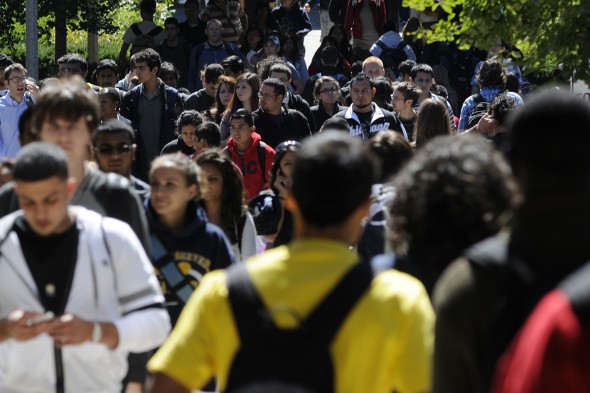UIC supports immigration reform, aid for undocumented students

“We view diversity not only as a commitment, but as a strength,” says a statement from top campus officials. Photo: Joshua Clark/UIC Photo Services
To support student opportunity, social justice and U.S. innovation and competitiveness, top UIC campus officials joined other college and university presidents in calling for April 19 as a “Day of Action” on immigration reform.
UIC will also establish a task force to work toward making undocumented students eligible for tuition waivers and other kinds of financial aid.
“We view diversity not only as a commitment, but as a strength, and we feel our nation would do well to do the same, as it has traditionally,” says the UIC Statement on Immigration signed by Chancellor Paula Allen-Meares and Provost Lon S. Kaufman.
UIC ranks first in the Midwest in the number of bachelor’s degrees earned by Latino students and has been designated an Asian American and Native American Pacific Islander-Serving Institution by the U.S. Department of Education.
The campus works to “ensure a welcoming and sustaining climate” for all its students, says Mrinalini Rao, professor of physiology and biophysics and interim special assistant to the provost for diversity.
“We guide prospective students through the college application process and to permitted sources of funding for their education,” Rao said.
“UIC has many ongoing initiatives on behalf of students, ranging from events across campus to collaboration with community partners and engagement with the City of Chicago and its schools and community colleges.”
The April 19 campus statement announced a new task force to work for changes in federal immigration policy.
The task force brings faculty, staff and students from UIC together with immigrant advocates from Chicago’s Latino, Asian American and East European communities to work for legislative reform that will enable undocumented students in Illinois to receive financial aid currently unavailable to them.
The Illinois DREAM Act, signed by Gov. Pat Quinn in 2011, enables students of any legal status who graduate from an Illinois high school to apply to state universities and, if accepted, pay in-state tuition.
However, federal law prohibits undocumented students from receiving financial support that is not mandated by state law, which excludes many sources of tuition relief.
